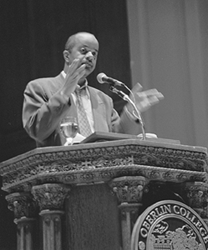

Speaking on his book, The Color of Water: A Black Man's Tribute to His White Mother, James McBride blended his unique, humorous style of speaking with his powerful words to make the Spring 1999 Campus Convocation a remarkable event.
McBride, whose book was on the New York Times Best Seller list for two years, graduated from Oberlin in 1979. He is a professional saxophone player and composer as well as a writer. He is currently working on an autobiography of Quincy Jones.
An opening by Rabbi Shimon Brand and a performance of "Sheryl," written and arranged by Conservatory senior Kevin Louis, added to the upbeat atmosphere surrounding McBride's speech.
With his top button unbuttoned, McBride had an easy demeanor. He joked with the audience from the beginning. "You like me; you really like me," he said.
McBride held Finney Chapel in rapture as he read excerpts from his book, which he used to explore himself while telling the story of his mother's life. This was expressed in the choice passages he read out loud.

Demonstrating his easily apparent love for his mother, McBride transported his audience into his childhood world. "Forty-one years old and I still call her mommy," he said. His excerpts highlighted his mother's past, moving from her white Jewish background to the black Christian culture she entered through marriage.
He noted that her family sat shiva when she married his father, an African-American man. "I had to die to create the new me," she says in his book in the chapter entitled "Death," McBride showed the audience in vivid words the effort his mother took to give her 12 children all she could. She eventually sent all of them to college from their ghetto background.
McBride also read passages from the chapter in his book entitled Black Power, about his brothers and sisters. He kept the packed chapel rolling in laughter when he described the events that occurred among his siblings as they scavenged for food. The laughter, however, seemed to be tempered with understanding of the truly dire situation that McBride found himself in when growing up and the almost desperate fight for food alone.
The third section McBride read described his mother's interaction with various Jewish salespeople when buying clothes for her children. He again had the audience in an uproar when he described his mother backing the salespeople into corners, bargaining and even breaking into Yiddish. And yet this too was modulated by one sentence in which he questioned where she had learned Yiddish. Her refusal to answer underlined her refusal to acknowledge her past and her desire to be completely enveloped in the society into which she had moved.
Even though the focus of McBride's talk was The Color of Water and his relationship with his mother, there were strong undertones of race issues. When asked openly about how he dealt with the racial issue at the end of the talk, McBride seemed almost indifferent to the reoccurring theme.
"It's not going to stop me from laughing," he said. McBride did make several relevant statements when openly questioned about how racism has affected his life. "You have to pick your battles judiciously," he said. "If people are really concerned with the race issue, they will start right here, right now."
When discussing racism, McBride made College President Nancy Dye cringe when he talked of the way Oberlin used to discriminate. He mentioned that if a trumpet was missing in the Conservatory, the professors would go immediately to Professor of African American Music Wendell Logan's office because of his race. "It was embarrassing," McBride said. He complimented Dye, however, on the progress that Oberlin has made since then after examining the calendar of events.
"This is not Harvard. This is not Yale. This is a special place," he said about Oberlin College and its students. This was his first time returning to the College since he graduated 20 years ago. He elaborated by saying that Oberlin, and especially his mentor Wendell Logan, gave him the "right to fail" and that right allowed him to succeed later on. He also said the College let him ask himself, "What do you really want to do?" Turning this question around to ask the audience, along with his few choice words on racism, were enough to transform talk that was not supposed to be decidedly inspirational, to one that seemed to excite the audience.
Although most were not quite sure what they were inspired to do, McBride seemed to set the tone for a good and productive semester.
"He was the best convocation speaker we've ever had," junior Neal Schindler said. "He managed to be funny without being trivial."
James McBride: Oberlin alumnus and noted writer James McBride spoke to students at Thursday's convocation. (photo by Pauline Shapiro)
Copyright © 1999, The Oberlin Review.
Volume 127, Number 13, February 12, 1999
Contact us with your comments and suggestions.